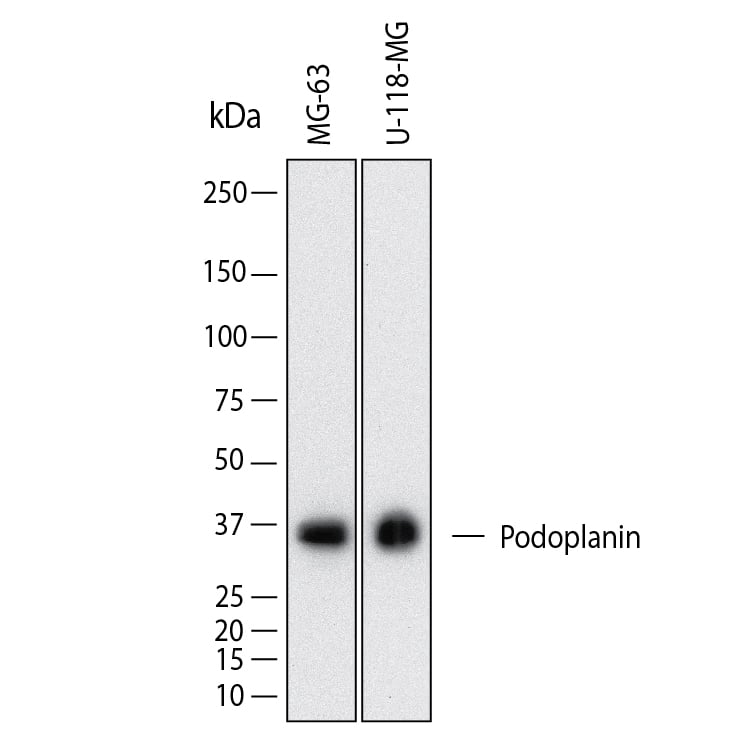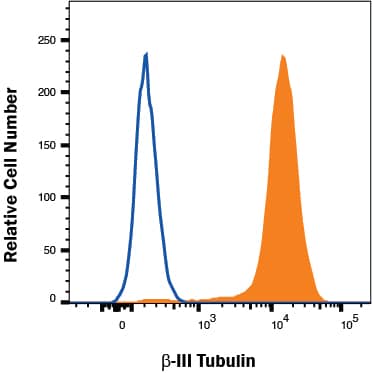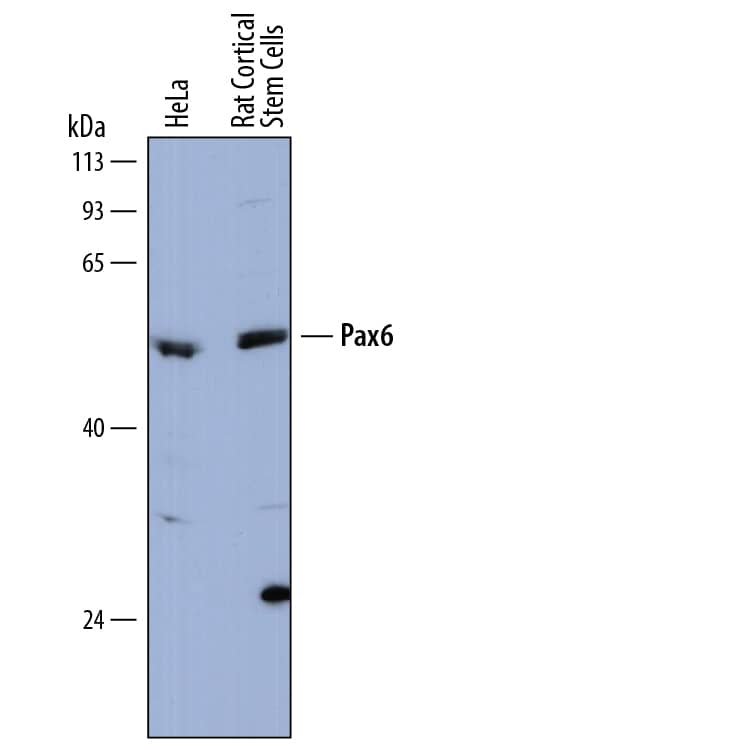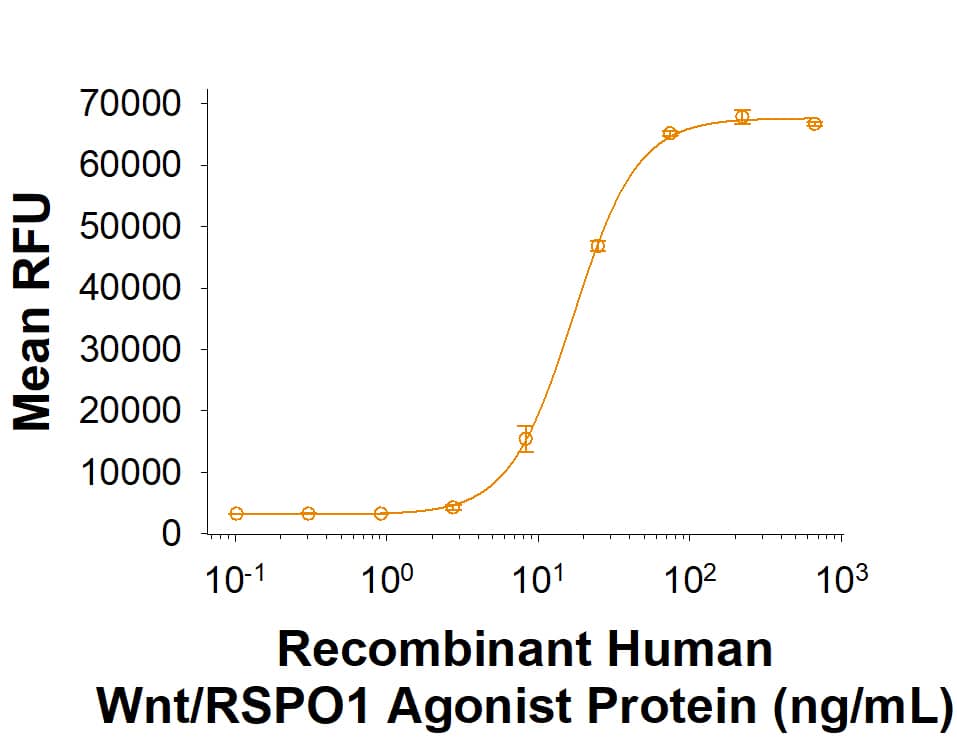Human Ki67/MKI67 Antibody Summary
Asn3120-Ile3256
Accession # P46013
Customers also Viewed
Applications
Please Note: Optimal dilutions should be determined by each laboratory for each application. General Protocols are available in the Technical Information section on our website.
Scientific Data
 View Larger
View Larger
Ki67/MKI67 in A549 Human Cell Line. Ki67/MKI67 was detected in immersion fixed A549 human lung carcinoma cell line using Sheep Anti-Human Ki67/MKI67 Antigen Affinity-purified Polyclonal Antibody (Catalog # AF7617) at 5 µg/mL for 3 hours at room temperature. Cells were stained using the Northern-Lights™ 557-conjugated Anti-Sheep IgG Secondary Antibody (red; NL010) and counterstained with DAPI (blue). Specific staining was localized to nuclei and nucleoli. View our protocol for Fluorescent ICC Staining of Cells on Coverslips.
 View Larger
View Larger
Ki67/MKI67 in Human Breast Cancer Tissue. Ki67/MKI67 was detected in immersion fixed paraffin-embedded sections of human breast cancer tissue using Sheep Anti-Human Ki67/MKI67 Antigen Affinity-purified Polyclonal Antibody (Catalog # AF7617) at 1 µg/mL overnight at 4 °C. Before incubation with the primary antibody, tissue was subjected to heat-induced epitope retrieval using Antigen Retrieval Reagent-Basic (CTS013). Tissue was stained using the Anti-Sheep HRP-DAB Cell & Tissue Staining Kit (brown; Catalog # CTS019) and counterstained with hematoxylin (blue). Specific staining was localized to the nuclei of epithelial cells. View our protocol for Chromogenic IHC Staining of Paraffin-embedded Tissue Sections.
 View Larger
View Larger
Detection of Human Ki67/MKI67 by Simple WesternTM. Simple Western lane view shows lysates of HeLa human cervical epithelial carcinoma cell line and MCF‑7 human breast cancer cell line, loaded at 0.2 mg/mL. A specific band was detected for Ki67/MKI67 at approximately 320 kDa (as indicated) using 20 µg/mL of Sheep Anti-Human Ki67/MKI67 Antigen Affinity-purified Polyclonal Antibody (Catalog # AF7617) followed by 1:50 dilution of HRP-conjugated Anti-Sheep IgG Secondary Antibody (HAF016). This experiment was conducted under reducing conditions and using the 66-440 kDa separation system.
 View Larger
View Larger
Detection of Human Ki67/MKI67 by Simple WesternTM. Simple Western lane view shows lysates of HeLa human cervical epithelial carcinoma cell line and Ki67 knockout HeLa cell line (KO), loaded at 0.2 mg/mL. A specific band was detected for Ki67/MKI67 at approximately 325 kDa (as indicated) using 20 µg/mL of Sheep Anti-Human Ki67/MKI67 Antigen Affinity-purified Polyclonal Antibody (Catalog # AF7617) followed by 1:50 dilution of HRP-conjugated Anti-Sheep IgG Secondary Antibody (HAF016). GAPDH (AF5718) is shown as a loading control. This experiment was conducted under reducing conditions and using the 66-440 kDa separation system.
 View Larger
View Larger
Ki67/MKI67 Specificity is Shown by Immunocytochemistry in Knockout Cell Line. Ki67/MKI67 was detected in immersion fixed HeLa human cervical epithelial carcinoma cell line but is not detected in Ki67/MKI67 knockout (KO) HeLa cell line using Sheep Anti-Human Ki67/MKI67 Antigen Affinity-purified Polyclonal Antibody (Catalog # AF7617) at 1 µg/mL for 3 hours at room temperature. Cells were stained using the NorthernLights™ 557-conjugated Anti-Sheep IgG Secondary Antibody (red; NL010) and counterstained with DAPI (blue). Specific staining was localized to nuclei. View our protocol for Fluorescent ICC Staining of Cells on Coverslips.
 View Larger
View Larger
Ki-67/MKI67 in human breast cancer using Dual RNAscope®ISH and IHC. MKi67 mRNA (red) and MKi67 protein (green) were detected in formalin-fixed paraffin-embedded tissue sections of human breast cancer. ACD’s Integrated Co-Detection Workflow was performed using ACD RNAScope Probe Hs-MKI67 (Catalog # 591771) and sheep anti-human Ki67/MKI67 polyclonal antibody (AF7617) at 5 μg/mL. Tissue was stained using RNAscope® 2.5 HD Detection Kit-RED (Catalog # 322360) and RNAscope® 2.5 LS Green Accessory Pack (Catalog # 322550). Tissue was counterstained with 50% hematoxylin (blue).
Preparation and Storage
- 12 months from date of receipt, -20 to -70 °C as supplied.
- 1 month, 2 to 8 °C under sterile conditions after reconstitution.
- 6 months, -20 to -70 °C under sterile conditions after reconstitution.
Background: Ki67/MKI67
MKI67 (also Ki67) is a 350-400 kDa nuclear protein that belongs to a molecular group comprised of mitotic chromosome-associated proteins. Ki67 was originally recognized as an antigen associated with the monoclonal Ki67 antibody raised against Hodgkin's lymphoma nuclear material. Ki67 is contextually expressed, being potentially found in all cells that are not in the Go phase of the cell cycle. Thus, MKI67 qualifies as a cell proliferation marker. Functionally, Ki67 is known to interact with 160 kDa Hklp2, a protein that promotes centrosome separation and spindle bipolarity. It also directly interacts with NIFK, and apparently binds to UBF, thus playing a role in rRNA synthesis. Human MKI67 is 3256 amino acids (aa) in length. It contains one FHA domain (aa 8-98), followed by at least 24 utilized Ser/Thr phosphorylation sites and sixteen 120 aa repeats (aa 1000-2928) that are interspersed with at least 90 additional utilized phosphorylation sites. There are two potential isoform variants. One isoform is 315-345 kDa in size and shows a deletion of aa 136-495, while a second isoform contains a 58 aa substitution for aa 1-513. Over aa 3120-3256, human Ki67 shares 46% aa sequence identity with the mouse ortholog to Ki67.
Product Datasheets
Citations for Human Ki67/MKI67 Antibody
R&D Systems personnel manually curate a database that contains references using R&D Systems products. The data collected includes not only links to publications in PubMed, but also provides information about sample types, species, and experimental conditions.
9
Citations: Showing 1 - 9
Filter your results:
Filter by:
-
Multiple cancer types rapidly escape from multiple MAPK inhibitors to generate mutagenesis-prone subpopulations
Authors: TE Hoffman, C Yang, V Nangia, CR Ill, SL Spencer
bioRxiv : the preprint server for biology, 2023-03-21;0(0):.
Species: Human
Sample Types: Whole Tissue
Applications: IHC -
Tau promotes oxidative stress-associated cycling neurons in S phase as a pro-survival mechanism: possible implication for Alzheimer's disease
Authors: M Denechaud, S Geurs, T Comptdaer, S Bégard, A Garcia-Núñ, LA Pechereau, T Bouillet, Y Vermeiren, PP De Deyn, R Perbet, V Deramecour, CA Maurage, M Vanderhaeg, S Vanuytven, B Lefebvre, E Bogaert, N Déglon, T Voet, M Colin, L Buée, B Dermaut, MC Galas
Progress in neurobiology, 2022-12-06;0(0):102386.
Species: Human
Sample Types: Whole Tissue
Applications: IHC -
Human immunocompetent choroid-on-chip: a novel tool for studying ocular effects of biological drugs
Authors: Madalena Cipriano, Katharina Schlünder, Christopher Probst, Kirstin Linke, Martin Weiss, Mona Julia Fischer et al.
Communications Biology
Species: Human
Sample Types: Whole Cells
Applications: Immunocytochemistry -
Fibroblastic FAP promotes intrahepatic cholangiocarcinoma growth via MDSCs recruitment
Authors: Y Lin, B Li, X Yang, Q Cai, W Liu, M Tian, H Luo, W Yin, Y Song, Y Shi, R He
Neoplasia, 2019-11-20;21(12):1133-1142.
Species: Human
Sample Types: Whole Tissue
Applications: IHC -
B-cell lymphoma 2 is associated with advanced tumor grade and clinical stage, and reduced overall survival in young Chinese patients with colorectal carcinoma
Authors: J Wang, G He, Q Yang, L Bai, B Jian, Q Li, Z Li
Oncol Lett, 2018-04-13;15(6):9009-9016.
Species: Human
Sample Types: Tissue Homogenates, Whole Tissue
Applications: IHC-P, Western Blot -
Amino Acid Transporter Slc38a5 Controls Glucagon Receptor Inhibition-Induced Pancreatic ? Cell Hyperplasia in Mice
Authors: J Kim, H Okamoto, Z Huang, G Anguiano, S Chen, Q Liu, K Cavino, Y Xin, E Na, R Hamid, J Lee, B Zambrowicz, R Unger, AJ Murphy, Y Xu, GD Yancopoulo, WH Li, J Gromada
Cell Metab., 2017-06-06;25(6):1348-1361.e8.
Species: Human
Sample Types:
-
SIVcpz closely related to the ancestral HIV-1 is less or non-pathogenic to humans in a hu-BLT mouse model
Authors: Zhe Yuan, Guobin Kang, Lance Daharsh, Wenjin Fan, Qingsheng Li
Emerging Microbes & Infections
-
Long non-coding RNA 00960 promoted the aggressiveness of lung adenocarcinoma via the miR-124a/SphK1 axis
Authors: Zhipeng Ge, Haibo Liu, Tao Ji, Qiaoling Liu, Lulu Zhang, Pengchong Zhu et al.
Bioengineered
-
Human immunocompetent choroid-on-chip: a novel tool for studying ocular effects of biological drugs
Authors: Madalena Cipriano, Katharina Schlünder, Christopher Probst, Kirstin Linke, Martin Weiss, Mona Julia Fischer et al.
Communications Biology
FAQs
No product specific FAQs exist for this product, however you may
View all Antibody FAQsReviews for Human Ki67/MKI67 Antibody
Average Rating: 5 (Based on 1 Review)
Have you used Human Ki67/MKI67 Antibody?
Submit a review and receive an Amazon gift card.
$25/€18/£15/$25CAN/¥75 Yuan/¥2500 Yen for a review with an image
$10/€7/£6/$10 CAD/¥70 Yuan/¥1110 Yen for a review without an image
Filter by:














